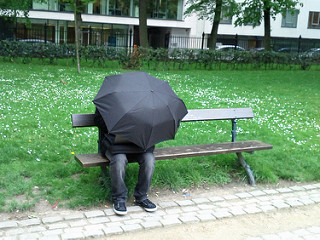Retention of audience data before the European Court of Justice: mass surveillance endgame in Europe -
recently, there was a hearing before the European Court of justice on the overall legality of data retention. Little is known about what was said - but we know who spoke. It seems that this could be an endgame to mass surveillance in Europe.
"Data Storage" is the technical term for the government spying on all communications and movements for the express purpose of being able to use against you in the future. It is a nasty term that seems technical to something really obvious, like "cardiac arrest", "under-pressure brake fluid" or "legislative excrement."
Unfortunately, the public tends to yawn at all this technique appears as illustrated by John Oliver on as technically sounding subject of net neutrality. This, in turn, is exactly why the authorities do everything would never be accepted if she understood her as technical as possible
But a set of two judgments of the European Court of Justice -. The European equivalent Supreme Court - can halt the practice of permanently ending the mass surveillance of age in Europe and restoring the presumption of innocence. Well, the end of the era of manifest mass surveillance, at least: there is still the NSA and accomplices to take care of. But one step at a time.
One of these decisions prohibiting mass surveillance at European level is already done. What remains is avoided again exactly the same at the state level (countries)
The backstory :. Data retention was an abomination which was precipitated by Europe in the wake of the 04 terrorist attacks in Madrid. Even then, such an invasive mass surveillance have never been accepted by the national parliaments of Europe; notorious surveillance hawks who wanted at all costs - the justice ministers of the four individual European countries: Sweden, Ireland, France and the UK - and blindsiding circumventing their national parliaments to create construction monitoring mass at European level, political force on policies at national level.
The plan worked, and the European Parliament adopted the Directive without precedent, where everyone is under constant surveillance, as if already suspected of a crime, 14 December 05 at this stage, national governments of Europe have made a turnaround oNE-EIGHTY: with the convenient excuse of "we must do" in their pocket, mass surveillance has been deployed in two-thirds of the Country European (one third - nine of 27 -. again blankly refused or had surveillance struck by the courts, while credit where credit is due).
what is remarkable, however, is that when the laws of national "data retention" were created in response to the EU directive for the existence of these laws, two thirds of European governments - with the excuse of "we" - went above and beyond the mandatory minimum in their national surveillance. Thus, all the excuses of "we are obliged to do so" incredibly sounded hollow when accompanied by the action of "luck, we monitor this and more."
It is important to realize that the European directive adopted in 05 - Directive on data retention - mandated the existence of these national monitoring mechanisms. Essentially, it reversed the concept of surveillance, without suspicion, "absolutely forbidden" to "mandatory". Although there were many screens have tried - especially along the lines of "no, it is not a government oversight because the government mandates telecommunications to real supervision on behalf of the government" ( yes!) At the end of the day it is - and was -. mass surveillance inexcusable
therefore, also said the European Court of Justice on April 8, 2014. The Directive was completely inexcusable and a breach wholesale of Fundamental Rights of the European Union were required to respect in accordance with the decision. The Court did not just settle for canceling the directive from that time; the Court struck down retrospectively , ruling that he never been in effect
The situation today :. Thus, the Directive forcing governments and national parliaments to have this mass surveillance has disappeared. Remarkably, they are now not to withdraw invasive mass surveillance inexcusable and they both lamented that they were coerced to implement. Instead, they seem rather well with it - at least, about two-thirds of European countries that have
There is an important distinction here .. At present, it does there is no level directive in Europe or in power require European states (yes, they are actually called "Member States" in the European Union) to have this data retention. But there is also no legislative or judicial decision Directive prohibit , even if current mass surveillance has been implemented under false pretenses. Therefore, we are currently in a situation where it is up to the individual states to have laws for data retention or not data retention laws, until someone says differently
this is exactly what happens :. Someone may be about to ban these laws at the state level as well. As the European Court of Justice has appointed this kind of legal equivalent mass surveillance "first order of horseshit", we can assume to say, no matter what kind of connected case is brought before it. But it can not rule on cases not brought before it. The only contested so far was the directive at European level.
The next thing therefore challenged the laws of conservation of individual state data that was gleefully implemented under false pretenses. Specifically, the conservation laws of the British and Swedish data are currently being challenged. On April 12, there was a large audience about this challenge to the European Court of Justice. We did not hear anything that was said in the actual audience, but we know that twelve states presented their case, indicating a huge interest in the challenge
What is the next:. On July 19, the European Court of Justice will present its preliminary finding. It does this as a general counsel issuing a recommendation to the Court for a final decision, the Court usually - but not always - follows. The actual decision usually follows about six months after the recommendation of the General Counsel. If the decision indicates that the mass surveillance at the state level is also unacceptable that the mass surveillance at the European level, then it could actually be the beginning of the end of it. This could actually be the final phase of mass surveillance in Europe.
We can hope. The courts have always been the most sense in all this mass surveillance hysteria.
Meanwhile, privacy remains your own responsibility.
 Wikipedia begins his
Wikipedia begins his 
